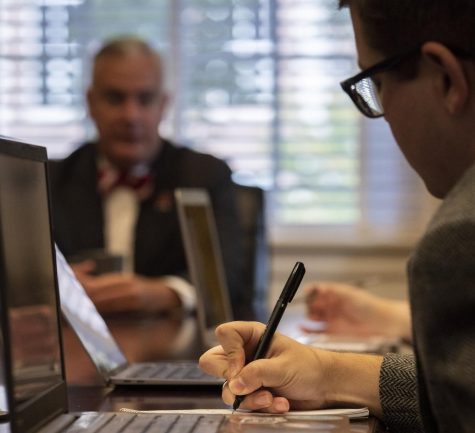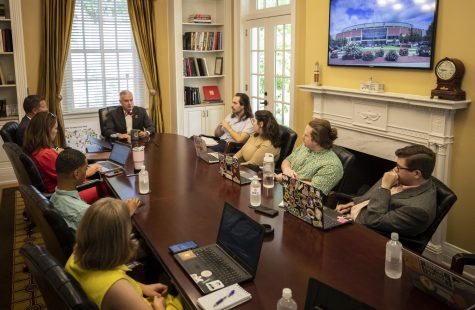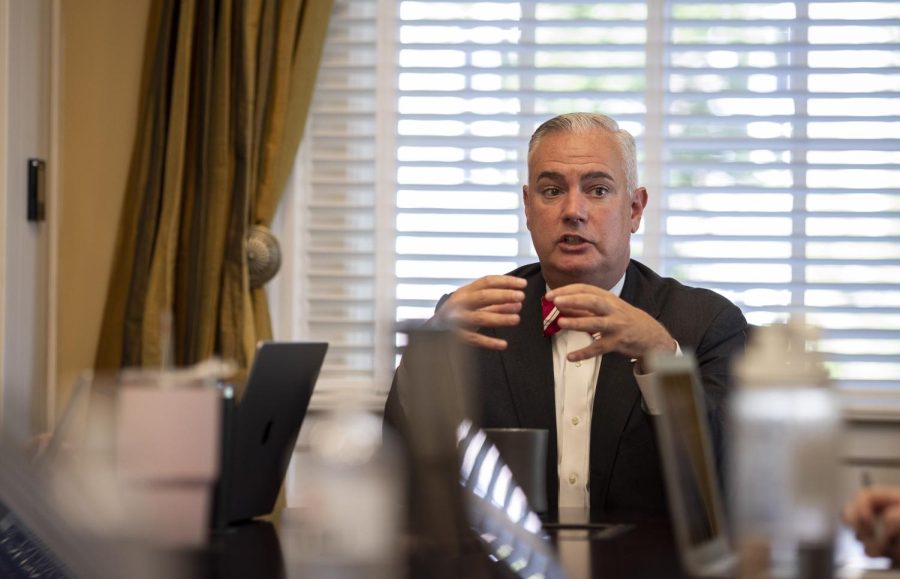6 takeaways from the Herald’s Caboni meeting
Tucker Allen Covey / College Height Herald
President Timothy Caboni speaks with College Heights Herald staff ahead of the new school year at the Craig Administrative Center on WKU’s campus in Bowling Green, Ky. on Friday, Aug. 19.
August 19, 2022
President Timothy Caboni sat down with Herald staff on Friday morning in the Craig Administrative Center for his regular semester meeting. Here’s what we learned:
Construction
As students return to the Hill for the fall semester, they will be met with ongoing construction near the top of campus.
Bryan Russell, chief facilities officer, said the construction is part of a “multi-phase” project that is spelled out in the university’s Master Plan, which seeks to beautify the campus by following the original design for the top of the Hill and to further push vehicle traffic to the edges of campus.
“We are excited about what the Hilltop Restoration Program will do for campus,” Caboni said. “I know that it’s a bit of an inconvenience today, and will be for the next several months into the spring and summer of next year, but at the end of the project we will have taken the opportunity with the removal of Garrett Conference Center to essentially return the top of the hill to President Cherry’s vision of an oval academical village.”
A pedestrian map showing closed off walkways and temporary paths can be found here.
Caboni said the finished project will provide “green space places to pause and ponder” as well as overlooks to offer better views of the campus’ southeast scenic vista. Additionally, the changes will remove vehicular traffic from a high-traffic area for students.
“We’ve been working hard to remove vehicular traffic from pedestrian walkways, and this will make it much safer for students, faculty and staff who walk campus,” Caboni said.
Tenure and Huss hearing
Caboni provided his thoughts on July’s specially called Board of Regents meeting, which featured an unprecedented, nine-hour hearing to decide on the fate of Jeanine Huss, a tenured professor in the School of Teacher Education.

The president made the recommendation to the board that Huss be dismissed for cause. Ultimately, the regents voted 8-0 to not dismiss her. Caboni was not part of the deliberation.
“What I’m proud of is that we actually followed our policies and procedures,” Caboni said. “Those are not crafted by an individual – those are negotiated through the shared governance process over months and, to be candid, years. We followed the process the faculty handbook outlines, and as a community I think we should be proud that we followed that process.”
Speaking on tenure as a whole, Caboni said that the university needs to be doing more to notice, honor and celebrate those who achieve it.
“Granting tenure is a huge responsibility that rests only with the Board of Regents,” Caboni said. “If they are going to have that responsibility, and be the only ones who can take tenure away, shouldn’t we as a community do more to highlight the decision to grant tenure?”
Caboni said the norm in recent years has been for notices of tenure to show up on a list of personnel actions, “a list of hundreds and hundreds of other decisions.”
“Because of that, I don’t think we have elevated the awarding of tenure, the decision that the board makes, the way we should,” Caboni said. “…I want those faculty members present when the moment happens, I would like for us to do something similar to what we do for emeritus professors, and goodness, we should have some sort of celebration.”
Additionally, the president said that as a tenured faculty continues their work, “you are also going to be evaluated.”
“The expectation is that everyone on our campus performs to an appropriate level. That’s by statute that we do post-tenure review, and we need to continue to work to ensure we grow and that post-tenure review is a formative process,” Caboni said. “Meaning, what have you done, what are you doing well, where can you do better and how can the institution support you in that.”
Initiatives to raise retention rates
Back in the spring, WKU announced fall-to-spring retention rates of 90.9% for 2021 first-time freshmen. The president said these rates are a result of putting students at the core of the university.
To continue retention growth, the university wants to focus on at-risk groups, including underrepresented minority students, first generation college students and students from low-income families.
According to Caboni, 85% of incoming freshmen will receive scholarship support, with financial aid increasing by $18.5 million in recent years.
The WKU Opportunity Fund, a fundraising campaign part of the 10 year strategic plan, has provided much of this aid. The Opportunity Fund has raised $70 million so far and has 184 new endowed funds.

Per Caboni, this fundraising is what has helped address raising retention rates for low-income students.
Caboni also wants to improve WKU’s campus pride index, used to measure inclusivity for LGBTQ+ individuals, to five stars.
WKU had a score of 2.5 stars when Caboni took office in 2017 and now sits at 4.5 stars. He said he expects WKU to hit five stars this year. He also spoke on supporting faculty and staff members with inclusion initiatives, including a faculty certificate for inclusive teaching.
“We’ve had programmatic interventions targeted at the places where we’ve done less well on retention, but all of the credit goes to our faculty and staff,” Caboni said. “The best predictor of retention is engagement with a faculty or staff member that creates a deep, meaningful relationship, and the same thing is true with a peer group.”
Caboni explained the national trend of fewer students deciding to go to college has not left WKU unscathed. The university, like many of its peers, is preparing for a demographic cliff to hit in 2025 – birth rates dropped during the 2008 recession, and the nation is about to feel it.
Although WKU has a smaller entering freshmen class, improving retention rates will ensure that more of those incoming students stay – rather than having a larger entering class but lower retention, Caboni said.
Resignation of former employee over housing and dining
Caboni confirmed that Mike Reagle, former assistant vice president for student engagement and executive director for housing and dining, resigned from his position in April.
Brian Kuster, who retired from the same position in 2020, is filling the vacancy in interim after being asked to do so by the Student Life Foundation, Caboni said.
“We certainly thank Mike [Reagle] for his efforts here on the Hill,” Caboni said. “Brian [Kuster] has a long and deep history with Housing and Residence Life but more importantly, the Student Life Foundation.”
Caboni said a search for an associate vice president for Housing and Residence Life is planned to take place.
Monkeypox
Two probable cases of monkeypox have been reported in Warren County as of Aug. 17, according to WBKO.
Caboni said WKU is keeping an eye on the statistics as the academic year approaches and more students come to campus.
“We are monitoring very closely,” Caboni said.
He urged that if students or faculty find themselves showing symptoms of the disease to get tested for monkeypox at the nearest medical center.
“What is important is that if anyone were to experience symptoms, fever or blisters, to immediately tell their health care provider, get tested and hopefully, if they’re in a group that is exposed or potentially more exposed to monkeypox, get vaccinated if possible,” Caboni said.
More resources for students and faculty moving into this semester can be found on the Healthy on the Hill website, including CDC guidance and the governor’s recommendations.
Eastern Kentucky Flooding
Heavy flooding claimed the lives of 38 Kentuckians across the eastern region of the Commonwealth last month. The disaster also set back decades of economic progress in some of the most impoverished areas of the U.S.
Caboni’s annual “Big Red Roadtrip” most recently brought him to Eastern Kentucky over summer break. He began in Pikeville and made stops in counties along the route back to Bowling Green – a journey of around 270 miles.
Caboni said the situation was “heartbreaking” and was sad to see that places he had just visited were “gone.”
“For our community, the same way the rest of the state didn’t forget us after the tornado, we have an obligation to help keep attention on Eastern Kentucky,” Caboni said. The Lady Toppers’ basketball team recently traveled to the area to deliver supplies.
Caboni said improving life in Eastern Kentucky requires bigger policy conversations. Coal jobs continue to trickle out of the area and shrinking communities are struggling to make up for lost industry.
“Part of that is calling attention to the governor’s effort to raise money,” Caboni said. “Money is the way to help these communities right now. As much as I wish it were, ‘I have food [to donate]’, that’s not really what they need. What they need is a continued infusion of cash for individuals.”
For more information on flood victim aid and how to donate, visit the Kentucky governor website.















